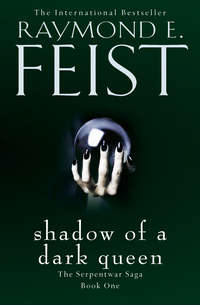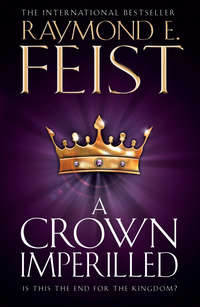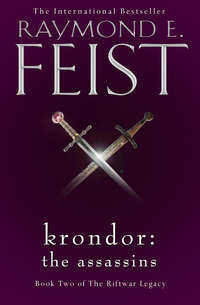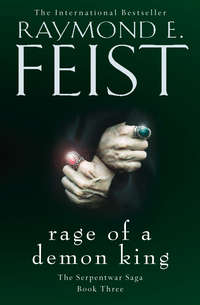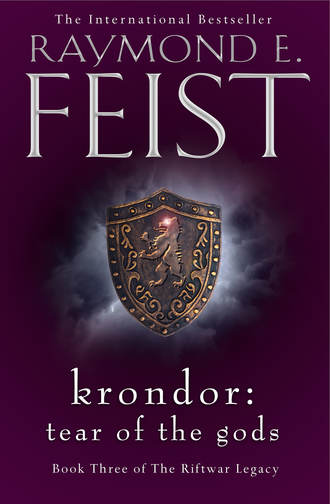
Полная версия
Krondor: Tear of the Gods
Pirates grabbed small chests and sacks and attempted to get back to the forward ladder. The ship was now heading down by the bow, picking up speed and rocking slightly from side to side. ‘Tell them to back water!’ shouted Knute, as he negotiated the ladder to the upper deck, clutching the small wooden chest as a mother would a baby. He saw a brilliant light coming through the captain’s cabin door and his eyes widened. Bear stood outlined against the glare, obviously struggling through the water as if engaged with a foe of some kind. ‘Get out!’ shouted Knute. ‘You’re going to drown!’ Not that Knute would shed a tear if that happened, but if Bear somehow came to his senses and made good his escape, Knute wanted to appear convincing in his role as loyal and concerned pilot.
Knute hurried to the gunwale and nimbly leaped atop it. Glancing at those behind him who were sliding across the deck, trying for the boat below, he called, ‘Hurry!’ The galley was backing away, and water rushed quickly into the hull of the Ishapian ship. Knute knew that, had he not given the order to back the galley, the weight of the dying ship might have pulled its bow under the waves.
A longboat bobbed on the water a few yards below and he muttered, ‘By the gods, I’ve gotta get out of this business.’
He glanced upward and saw the cargo boom with the net loaded with treasure being lowered to the deck of the galley. With a quick prayer to every god he could remember, Knute leaped from the sinking ship, hitting the water while he clutched the small chest with all his might. Weight pulled him downward and he struggled, and finally his head broke the surface as voices echoed across the water. With his free arm he struck out for the longboat, reaching it quickly. Strong hands reached over the side and pulled him aboard.
‘The ship sinks!’ men yelled as they leaped from the deck into the foam.
‘Leave the rest!’ shouted a man holding what appeared to be a large sack of gold coins. He hit the water, and after a minute his head broke the surface. He struggled mightily to get the sack aboard Knute’s boat.
‘No! Noooo!’ came Bear’s anguished cry from the bowels of the sinking ship as Knute helped the pirate aboard the boat.
‘Sounds like the boss is having a problem,’ said the drenched pirate.
‘Row,’ instructed Knute. The sailor complied and Knute looked over his shoulder. ‘Whatever the boss’s problems, they’re no longer ours.’
‘You going to leave him?’ said one of Knute’s men.
‘Let’s see if that cursed amulet keeps him alive on the bottom of the sea.’
One of the pirates grinned. Like the rest of his brethren he had been obedient out of fear as much as any loyalty to Bear. ‘If it does, he’s going to kill you, Knute.’
‘He’s got to find me first,’ said the wily pilot. ‘I’ve sailed with that murdering lunatic three times, which is two too many. You’ve been his slaves long enough. Now it’s our turn to live the high life!’
The pirates rowed. One of Bear’s crew said, ‘If he does make it out alive, he’ll find others to follow him, you know that? Why shouldn’t I cut your throat now and gain his favour?’
‘Because you’re greedy, like me. If you cut my throat, you’ll never get that galley safely out of these rocks. Besides, even if Bear lives, it’ll be too late,’ said Knute. ‘We’ll all be safely gone.’
They reached the galley and quickly climbed aboard, other longboats and a few swimmers reaching the ship at the same time. The ship creaked as the longboats were hoisted aboard. Men scrambled up ropes while others lowered nets to haul the riches taken from the Ishapian ship. The crew moved with an efficiency rarely seen, spurred on by equal shares of avarice and the fear that Bear would suddenly appear. Finally they lashed the cargo to the centre deck and Knute said, ‘Get underway!’
‘Where are we going?’ asked one of the pirates who had rowed Knute to the galley.
‘To a rendezvous down the coast. I’ve got some men waiting for us who will offload this cargo, then we row this galley out to sea and sink it.’
‘Why?’ asked another man as the crew gathered around Knute.
‘Why?’ echoed Knute. ‘I’ll tell you why, fool. That ship we took was the property of the Temple of Ishap. In a few days the entire world is going to be looking for the men who sank it. Bear’s got that ward against priests, but we don’t. We’ll divide up our shares and go our separate ways, tonight!’
‘Sounds good,’ said one of the sailors.
‘Then get to the oars! The slaves are half dead and I want us split up and every man on his own by sunrise!’ shouted Knute.
Just then, Bear’s voice cut through the storm. ‘It’s mine!! I had it in my hands!’
All eyes turned to the sinking ship, and against a lightning flash they could see Bear standing at the rail. Slowly, he climbed atop it, shook his fist as the retreating galley, and leaped into the water.
Like a spur to a horse, the sight of Bear plunging into the water as if to swim after them caused the sailors to spring to action. Below, the hortator’s drum began to sound as slaves were unchained and pushed aside by frantic pirates. Knute paused a moment to look where Bear had stood outlined against the lightning flashes. For an instant Knute could have sworn Bear’s eye had been glowing red.
Knute shuddered and turned his mind away from Bear. The man was terrible in his anger and his strength was unmatched, but even Bear wouldn’t be able to storm into the Prince’s city and find Knute.
Knute smiled. The men waiting for him were expecting a ship full of riches and a dead crew. Poisoned wine and ale waited below, and Knute would pass it out minutes before reaching the rendezvous. By the time the cargo was offloaded and aboard the wagons, every pirate and slave below would be a corpse. His own men would also be departed, but that was an unfortunate circumstance he couldn’t avoid. Besides, it meant more for him and those driving the wagons.
All his life he had waited for an opportunity like this and he was going to be ruthless in taking advantage of it. None of these men would lift a finger to help Knute, he knew, if his life was at risk, so what did he owe them? Honour among thieves might exist with the Mockers, where the Upright Man’s bashers ensured honourable behaviour, but on a ship like Bear’s, the rule was strictly survival by strength, or by wits.
Knute shouted orders and the ship heeled over as it turned against the waves, striking for a safer course away from the rocks of Widow’s Point. Soon the ship was clear of the last of the underwater rocks, and the rowers struck a steady pace. The little pilot moved to the stern of the galley and looked over the fantail. In a brief flash, for an instant, he thought he saw something in the water. It was a swimmer, following after the ship with a powerful stroke.
Knute’s eyes strained as he peered through the darkness, but nothing more was glimpsed of the swimmer. He rubbed his eyes. It must be the excitement, he thought, the chance to at last be rich and out from under the heel of men like Bear.
Turning his mind to the future, he again grinned. He had made deals before. He would pay off the wagoners, have them killed if necessary, and by the time he reached Krondor, every silver coin, every golden chain, every sparkling gem would be his.
‘Where are we going?’ asked a pirate.
‘Captain,’ said Knute.
‘What?’
‘Where are we going, Captain,’ Knute repeated, coolly.
The pirate shrugged, as if it didn’t matter, and said, ‘Where are we going, Captain? How far down the coast are your men?’
Knute grinned, knowing that this man – like every other man in the crew – would happily let him play at command up to the minute they’d cut his throat if they thought he would make them rich. He played along. ‘We’re meeting a gang at the beach north of Fishtown, outside of Krondor.’
‘Fishtown it is!’ said the man, quickly adding, ‘Captain!’
Throughout the night the crew rowed, and when dawn was less than two hours away, Knute called one of his most trusted crewmen over. ‘How are things?’
‘Bear’s men are nervous, but they’re not smart enough to plan anything if they think they might lose out on what we’ve taken. But they’re still jumpy. You don’t cross someone like Bear and sleep soundly.’
Knute nodded, then said, ‘If everything’s secure, there’s some wine and ale below. Break it out.’
‘Aye, Captain,’ said the man, his grin widening. ‘A celebration, eh? That will take the edge off.’
Knute returned the grin, but said nothing.
Within minutes the noise of celebration emanated from below. For hours all Knute had heard was an ominous silence punctuated by the sound of rhythmic rowing, oars groaning in their oarlocks, wood creaking as the hull flexed, and the rattle of tackle and blocks in the rigging. Now the murmur of voices arose, some joking, others surprised, as men made the rounds of the rowing benches with casks and cups.
One of the pirates looked at Knute across the deck and Knute shouted, ‘See that those aloft go below for a quick drink! I’ll take the helm!’
The pirate nodded, then shouted aloft as Knute made his way to the stern of the ship. He said to the helmsman, ‘Go get something to drink. I’ll take her in.’
‘Going to beach her, Captain?’
Knute nodded. ‘We’re coming in a bit after low tide. She’s heavy as a pregnant sow with all this booty. Once we offload, when high tide comes in, she’ll lift right off the beach and we can back her out.’
The man nodded. He was familiar with the area near Fishtown; the beaches were gentle and Knute’s plan made sense.
Knute had chosen a slow-acting poison. As he took the helm, he calculated that he’d be coming into the beach by the time the first men began to pass out. With luck, those still alive would assume their companions were insensible from drink. With even more luck, the wagoners he had hired out of Krondor wouldn’t have to cut any throats. They were teamsters working for a flat fee, not bully boys.
Knute had piled one lie atop another. The wagoners thought he was working for the Upright Man of Krondor, the leader of the Guild of Thieves. Knute knew that without that lie he would never control them once they saw the wealth he was bringing into the city. If the teamsters didn’t believe a dread power stood behind Knute, he’d be as dead as the rest of the crew come morning.
The sound of the water changed, and in the distance Knute could hear breakers rolling into the beach. He hardly needed to look to know where he was.
One of the pirates came staggering up the companionway from below and spoke. His speech was slurred. ‘Captain, what’s in this ale? The boys are passin’ …’ Knute smiled at the seaman, a young thug of perhaps eighteen years. The lad pitched forward. A few voices from below shouted up to the deck, but their words were muffled, and quiet soon descended.
The oars had fallen silent and now came the most dangerous part of Knute’s plan. He lashed down his tiller, sprang to the ratlines and climbed aloft. Alone he lowered one small sail, shimmied down a sheet, and tied off. That little sail was all he had to keep him from turning broad to the waves and being smashed upon the beach.
As he reached the tiller, a hand descended upon Knute’s shoulder, spinning him around. He was confronted by a leering grin of sharpened teeth as dark eyes studied him. ‘Shaskahan don’t drink ale, little man.’
Knute froze. He let his hand slip to a dagger in his belt but waited to see what the cannibal would do next. The man was motionless. ‘Don’t drink ale,’ he repeated.
‘I’ll give you half the gold,’ Knute whispered.
‘I take all of it,’ said the cannibal, as he drew out his large belt knife. ‘And then I eat you.’
Knute leaped backward and drew his own knife. He knew that he was no match for the veteran killer, but he was fighting for his life and the biggest trove of riches he would ever see. He waited, praying for a few more moments.
The cannibal said again, ‘Shaskahan don’t drink ale.’ Knute saw the man’s legs begin to shake as he took a step forward. Suddenly the man was on his knees, his eyes going blank. Then he fell face forward. Knute cautiously knelt next to the man and examined him. He sheathed his knife as he leaned close to the cannibal’s face, sniffed once, then stood.
‘You don’t drink ale, you murdering whore’s son, but you do drink brandy.’
With a laugh Knute unlashed the tiller as the ship swept forward into breakers. He pointed it like an arrow at a long, flat run of beach and as the ship ploughed prow first into the sand, he saw the three large wagons sitting atop the bluffs. Six men who’d been sitting on the shore leapt to their feet as the ship ground to a halt in the sand. Knute had ordered the wagons not be brought down to the cove, for once loaded they’d be sunk to their hubs in sand. The teamsters would have to cart all the gold up the small bluff to the wagons. It would be hard, sweaty work.
No sooner had the ship stopped moving than Knute was shouting orders. The six wagoners hurried forward, while Knute pulled his knife. He was going to ensure no one below recovered from too little poison, then he was going to get that treasure to Krondor.
There was one man in the world he knew he could trust and that man would help him hide all these riches. Then Knute would celebrate, get drunk, pick a fight, and get himself thrown into jail. Let Bear come for him, thought Knute, if by some miracle he had survived. Let the crazed animal of a pirate try to reach him in the bowels of the city’s stoutest jail, surrounded by the city watch. That would never happen – at the very least Bear would be captured by the city guards; more likely he’d be killed. Once Knute knew for certain Bear’s fate, he could bargain for his own life. For he was the only man who knew where the Ishapian ship had gone down. He could lead the Prince’s men and a representative of the Wreckers’ Guild to the site, where the Wreckers’ Guild’s mage could raise the ship and they could offload whatever trinket it was that Bear had been after. Then he’d be a free man while Bear rotted in the Prince’s dungeon or hung from the gibbet or rested at the bottom of the sea. And let everyone think the rest of the treasure went down with the pirate ship in the deep water trench just a mile offshore.
Knute congratulated himself on his masterful plan, and set about his grisly work, as the wagoners from Krondor climbed aboard to offload ‘the Upright Man’s treasure.’
Miles away as the dawn broke, a solitary figured emerged from the breakers. His massive frame hung with clothing tattered and soaked from hours in the brine. He had tossed aside his weapons to lighten himself for a long swim. One good eye surveyed the rocks and he calculated where he had come ashore. With dry sand under his now bare feet, the huge pirate let out a scream of primal rage.
‘Knute!’ he shouted at the sky. ‘By the dark god I’ll hunt you down and have your liver on a stick. But first you’ll tell me where the Tear of the Gods is!’
Knowing that he had to find weapons and a new pair of boots, Bear turned northward, towards the secret temple at Widow’s Peak and the village of Haldon’s Head. There he would find some men to serve him and with their help they would track down Knute and the others. Every member of his crew who had betrayed him would die a slow, agonizing death. Again Bear let out a bellow of rage. As the echoes died against the windswept rocks, he squared his shoulders and began walking.
• CHAPTER ONE •
Arrival
JAMES HURRIED THROUGH THE NIGHT.
As he moved purposefully across the courtyard of the Prince’s palace in Krondor, he still felt the odd ache and twinge, reminders of his recent beating at the hands of the Nighthawks while he had been their captive. For the most part he was nearly back to his usual state of fitness. Despite that, he still felt the need for more sleep than usual, so of course, he had only just settled into a deep slumber when a page came knocking upon his door and informed James that the overdue caravan from Kesh had been sighted approaching the city. James had gotten up and dressed despite every fibre of his being demanding that he roll over in his warm bed and return to slumber.
Silently cursing the need to meet the arriving magician, he reached the outer gate where two guards stood their stations.
‘Evening, gentlemen. All’s well?’
The senior of the two guards, an old veteran named Crewson, saluted. ‘Quiet as the grave, Squire. Where’re you bound at this ungodly hour?’ He motioned for the other guard to open the gate so that James could leave the precinct of the palace.
Stifling a yawn, James said, ‘The Prince’s new mage has arrived from Stardock, and I’ve the dubious honour of meeting her at the North Gate.’
The younger guard smiled in mock sympathy. ‘Ah, you’ve all the luck, Squire.’ He swung the gate wide to allow James to depart.
With a wry smile, James passed through the opening. ‘I’d rather have a good night’s sleep, but duty calls. Fare you well, gentlemen.’
James picked up his pace, as he knew the caravan would disband quickly upon arrival. He wasn’t worried about the magician’s safety, as the city guard would be augmented by caravan guards coming off duty, but he was concerned over the possible lapse in protocol should he not be there to greet her. While she might be only a distant relative of the Ambassador from Great Kesh to the Western Court, she was still a noble by rank, and relations between the Kingdom of the Isles and Great Kesh had never been what one might call tranquil. A good year was one in which there were three or fewer border skirmishes.
James decided to take a shortcut from the palace district to the North Gate, one that would require he pass through a warehouse district behind the Merchants’ Quarter. He knew the city as well as any living man, and had no concerns about getting lost, but when two figures detached themselves from the shadows as he rounded a corner, he cursed himself for a fool. The out-of-the-way route was unlikely to be host to many citizens abroad on lawful business at this time of night. And these two looked nothing like lawful citizens.
One carried a large billy club and had a long belt knife, while the other rested his hand easily upon a sword. The first wore a red leather vest while his companion wore a simple tunic and trousers. Both had sturdy boots on, and James instantly recognized them for what they were: common street thugs. They were almost certainly freebooters, men not associated with the Mockers, the Guild of Thieves.
James pushed aside his self-recriminations for taking this shortcut, for the matter was now beyond changing.
The first man said, ‘Ah, what’s the city coming to?’
The second nodded, moving to flank James should he try to run. ‘It’s a sad state of affairs. Gentlemen of means, wanderin’ the streets after midnight. What can they be thinking?’
Red-vest pointed his billy club at James and said, ‘He must be thinkin’ his purse is just too heavy and be hopin’ for a helpful pair like us to relieve him of it.’
James let out a slow breath and calmly said, ‘Actually, I was thinking about the foolishness of men who don’t recognize a dangerous mark when they see one.’ He drew his rapier slowly and moved the point to halfway between the two men, so that he would be able to parry an attack from either man.
‘The only danger here is tryin’ to cross us,’ said the second thug, drawing his sword and lashing out at James.
‘I really don’t have time for this,’ James said. He parried the blow easily and riposted. The swordsman barely pulled back in time to avoid being skewered like a holiday pig.
Red-vest pulled out his belt knife and swung his billy club, but James ducked aside and kicked out with his right leg, propelling the man into his companion. ‘You still have time to run away, my friends.’
Red-vest grunted, recovered his balance, and rushed James, threatening with the billy club while holding his knife in position to do the real damage. James recognized the man’s outrage – this was no longer a simple mugging; these two men now meant to kill him. He ignored the billy club, dodging towards it rather than away, and sliced at the man’s left wrist. The knife fell to the stones with a clatter.
While Red-vest howled in pain and fell back, his companion came rushing in, his sword cocked back over his shoulder. James danced backward for two steps, and as the man let fly with his wide swing – designed to decapitate the young squire – James leaned forward in a move he had learned from the Prince, his left hand touching the stones to aid his balance and his right hand extending out. The attacker’s sword passed harmlessly over James’s head and he ran onto the point of James’s rapier. The man’s eyes widened in shock and he came to an abrupt halt, looked down in disbelief, then collapsed to his knees. James pulled his sword point free and the man toppled over.
The other brigand caught James by surprise coming over the shoulder of his collapsing friend, and James barely ducked away from a thrust that would have certainly split his head. He took a glancing blow on his left shoulder, still sore from the beating he had taken at the hands of the Nighthawks, and gasped at the unexpected pain. The hilt of the knife had struck, so there was no blood – his tunic wasn’t even ripped – but damn it, he thought, it hurt!
James’s training and battle-honed reflexes took over, and he turned with the attacker, his sword lashing out again as the man went by, and stood behind him as he too went down to his knees, then toppled over. James didn’t even have to look to know his sword had cut Red-vest’s throat in a single motion.
James wiped his sword off on the shirt of the first man he had killed and returned it to its sheath. Rubbing his sore left shoulder, he shook his head and muttered, ‘Idiots,’ quietly under his breath. Resuming his journey he marvelled, not for the first time, at humanity’s capacity for stupidity. For every gifted, brilliant man like Prince Arutha, there seemed to be a hundred – no, make that a thousand – stupid men.
Better than most men in the Prince’s court, James understood the petty motives and narrow appetites of most citizens. As he turned his back on the two dead men, he acknowledged to himself that most of the population were decent people, people who were tainted by only a little larceny, a small lie about taxes owed, a little shorting of a measure, but in the main they were good.
But he had seen the worst and best of the rest, and had gone from a fraternity of men bent on trivial gain by any means, including murder, to a fellowship of men who would sacrifice even their own lives for the greater good.
His ambition was to be like them, to be noble by strength of purpose and clarity of vision rather than by accident of birth. He wanted one day to be remembered as a great defender of the Kingdom.
Ironically, he considered how unlikely it was that that would ever happen, given his current circumstance. He was now commissioned to create a company of spies, intelligence men who were to act on behalf of the Crown. He doubted Prince Arutha would appreciate him telling the ladies and gentleman of the court about it.
Still, he reminded himself as he turned another corner – glancing automatically into the shadows to see if anyone lurked there – the deed was the thing, not the praise.
Absently rubbing his right shoulder with his left hand, he noted how it had been overstrained by the swordplay. The little exercise with the two brigands was reminding him he wasn’t fully healed from his recent ordeal in the desert at the hands of the Nighthawks – a band of fanatic assassins. He had been up and around within days of returning to Krondor, but he was still feeling not quite right after three weeks. And two sore shoulders would continue to remind him of it all for a couple of days, at least.
Sighing aloud, James muttered to himself: ‘Not as spry as I once was, I fear.’




